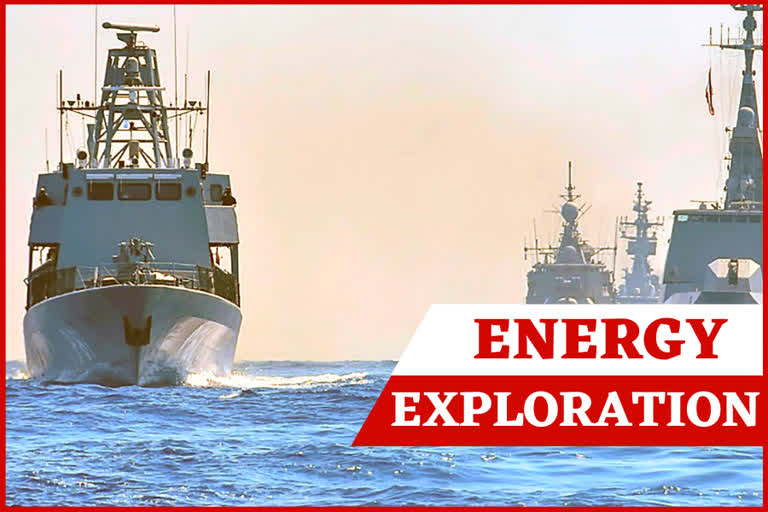Athens: Despite a denial from Greece, the chief of NATO said Friday that Greece and Turkey have started technical discussions aimed at reducing the risk of armed conflict or accidents amid military tensions between the allies over offshore energy resources in the eastern Mediterranean.
No agreement has been reached from the military-level talks, NATO Secretary-General Jens Stoltenberg said.
Greece's foreign minister, meanwhile, headed to New York to discuss the regional dispute centered around maritime boundaries and drilling rights.
Neighbors and NATO allies Greece and Turkey have been locked for weeks in a tense standoff in the eastern Mediterranean, where Turkey is prospecting the seabed for energy reserves in an area Greece claims as its own continental shelf.
Read also: Explained: Turkey-Greece dispute over Eastern Mediterranean
Ankara says it has every right to prospect there and accuses Greece of trying to grab an unfair share of maritime resources.
Stoltenberg announced Thursday that the two sides had agreed to start "technical talks" to reduce the risks of military "incidents and accidents."
But Athens quickly denied any such agreement, saying Turkey must first withdraw its ships from the area where it is carrying out gas and oil prospecting. Ankara said it backed Stoltenberg's initiative for military and technical talks and called on Greece to do the same.
On Friday, the NATO chief said Greek, Turkish and allied military officers had begun talks aimed at ensuring that some of the standoffs between the two countries' armed forces in the Mediterranean don't break out into open conflict. NATO officials said the first talks were held Thursday.
"As long as we have so many ships in the eastern Mediterranean, we believe that there is a need to have technical talks on how to develop enhanced mechanisms for deconfliction," Stoltenberg told reporters. "No agreement has been reached yet, but the talks have started."
While it's relatively rare for NATO to have to step in to reduce tensions between member nations, the military alliance has helped set up similar systems in the past, including communications hotlines for use in case of emergencies.
Stoltenberg underlined that the military-level talks are only aimed at avoiding any incident between Greece and Turkey and are very distinct from the diplomatic efforts to find a long-term solution to the standoff.
"These are technical talks rather than negotiations on the underlying dispute between Greece and Turkey and as such they are meant to complement, not replace, the efforts led by Germany for political mediation towards de-escalation," he said.
Since Turkey dispatched a vessel accompanied by warships to do exploratory research, Greece's armed forces have been placed on alert. Both countries sent warships to the area and carried out live-fire exercises between the islands of Crete and Cyprus and Turkey's southern coast.
Simulated dogfights between Greek and Turkish fighter pilots have multiplied over the Aegean Sea and the eastern Mediterranean. A Turkish and a Greek frigate collided last month, reportedly causing minor damage to the Turkish frigate but no injuries.
The crisis is the most serious in the two countries' relations in decades. The neighbours have come to the brink of war three times since the mid-1970s, including once over maritime resources in the Aegean Sea.
Greek Foreign Minister Nikos Dendias' meeting with U.N. Secretary-General Antonio Guterres will focus on "issues of international and regional interest, with an emphasis on current developments in the eastern Mediterranean and the Cyprus issue, as well as the role of the U.N.." the Greek Foreign Ministry said.
Greek Prime Minister Kyriakos Mitsotakis said Dendias would be delivering a letter from him to Guterres detailing what he said was Turkey's illegal activity in the region.
Speaking with China's top diplomat, Yang Jiechi, in Athens, Mitsotakis said Greece faces aggression from Turkey and "actions that dispute every rule of the U.N. charter, with a rhetoric that distorts history and changes geography, undermining legality and with actions that are endangering security in the entire Mediterranean."
Mitsotakis said Greece supports good neighborly relations, and noted Turkish President Recep Tayyip Erdogan has said he is open to dialogue.
"And to this I reply with six clear words: The provocations stop, the dialogue starts," Mitsotakis said.
Turkish Foreign Minister Mevlut Cavusoglu meanwhile accused Greece of "lying" about the NATO initiative, saying Stoltenberg had consulted with Ankara and Athens — and both agreed to the technical talks — before making his announcement.
"Greece has refuted the NATO secretary-general," Cavusoglu told reporters. "But it isn't the NATO secretary-general who is lying, it's Greece itself who is lying. ... Greece has once again shown that it does not favor a dialogue."
Cavusoglu and Stoltenberg later held a telephone conversation to discuss the eastern Mediterranean, the Turkish Foreign Ministry said, but didn't provide details.
A Greek Foreign Ministry official retorted that Cavusoglu "anxious to shift the focus of the debate from Turkey's illegal behavior, has baptized as 'talks' a NATO proposal on a technical level for a reduction of the tension Turkey itself is causing in the eastern Mediterranean region."
The official spoke on condition of anonymity as he was not authorized to speak on the record on the issue.
Meanwhile, the spokesman for Turkey's ruling party, Omer Celik, said the European Union could no longer count on Turkey's cooperation in stemming the flow of migrants and refugees to Europe if it goes ahead with plans to sanction Turkey over its exploration operations in the eastern Mediterranean.
"I don't expect things to come to the point of sanctions. The EU should not expect cooperation on refugees after that time," Celik said in an interview with Turkey's NTV news channel. "They should not think that they can sanction (Turkey) in the eastern Mediterranean and continue to cooperate in other areas."
Earlier this year, tens of thousands of migrants gathered at Turkey's border with Greece, demanding to be allowed to cross, after the Turkish president declared the borders with Europe open to migrants wanting to head into EU nations.
AP



